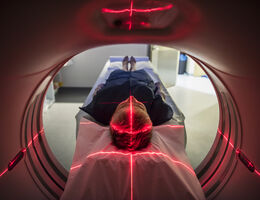

Several key lifestyle factors, such as diet and exercise, are widely acknowledged for impacting our cardiovascular health. Sleep is one historically overlooked component of heart health that has only come under the spotlight in recent years, says Victoria Bazanos, DNP, a nurse practitioner who specializes in advanced heart failure cardiology expert at Loma Linda University International Heart Institute.
For February's American Heart Month, Bazanos provides an overview of the sleep-heart connection and recommends achieving better sleep to nurture the heart.
The sleep-heart connection
In recent years, the American Heart Association updated their “Life’s Simple 7” predictors of heart health (such as diet, smoking, and cholesterol) to “Life’s Essential 8” by adding sleep as a key measure for improving and maintaining cardiovascular health.
“Sleep is something we tend to take for granted,” Bazanos says. “We may view it as free time to cut into when we need to get something done, as opposed to changing our daily schedules or setting boundaries to protect or prioritize our rest."
Read: Balancing heart health with long working hours
But Bazanos says sleep is when the body performs several vital functions, from healing and repairing cells to strengthening the immune system. "When you take time away from that, you're taking time away from your body and all its organs, including the heart, to heal itself.”
During sleep, heart rate and blood pressure are typically lower than when a person is awake, thus decreasing the heart's workload and allowing it to rest. This nightly drop in heart rate and blood pressure is good for overall cardiovascular health, Bazanos says. When the body doesn't experience this nightly drop, some of sleep’s beneficial effects can be lost. Some studies suggest that up to 80% of cardiovascular events, such as heart attacks, can be prevented through healthy lifestyle choices, including getting the right amount of sleep.
Poor sleep increases stress hormones, elevating blood pressure, heart rate, blood sugar levels, and cholesterol — all contributing to cardiovascular disease. Research from the National Heart, Lung, and Blood Institute found adults who regularly slept seven to eight hours every night reported lower rates of hypertension and obesity. Bazanos adds that sleep helps us regulate hormones, including hormones that control hunger; those who sleep five or fewer hours per night report higher rates of obesity and diabetes, conditions closely linked with poor cardiovascular health.
Read: Protect your heart health amidst anxiety, stress
Inadequate sleep can also cause an increase in C-reactive protein, an inflammatory marker associated with higher levels of atherosclerotic coronary artery disease, Bazanos says.
Bazanos shares several sleep disorders with explicit links to cardiovascular health:
- Persistent insomnia, the inability to fall asleep or stay asleep, is associated with a 45% higher risk of cardiovascular disease and a 54% higher risk of stroke, according to the American Heart Association.
- Sleep apnea, abnormal breathing that leads to a drop in oxygen levels during sleep, is associated with higher rates of hypertension, stroke, coronary artery disease, and heart failure.
- Narcolepsy, excessive daytime sleepiness, while rare, can have serious cardiovascular effects, including increased risk of hypertension, heart attack, heart failure, and stroke.
Read: Having trouble with your sleep? Ask your primary care doctor about at-home sleep studies
She advises familiarizing yourself with the symptoms of common sleep disorders and sharing your experiences with your care provider.
“Not getting enough sleep can create a cascade of interconnected events that wreak havoc on the heart and the rest of the body,” Bazanos says. “Ensuring quality rest and sleep is one way we can help combat these devastating chronic illnesses, and it's something that anybody can do.”
Boost heart health through sleep
Adults should receive seven to nine hours of sleep nightly — more for children and adolescents. Bazanos recommends establishing a robust sleep hygiene routine to nurture your heart health in the following ways:
- Stick to a consistent bedtime. Going to bed and waking up around the same time stabilizes your body's circadian rhythm or internal clock. This inner body clock draws from your sleep patterns to determine the best time to sleep at night and when to wake up for a maximally restful sleep.
- Avoid consuming caffeine, alcohol, nicotine, and heavy meals — especially right before bed.
- Go screen-free. Turn off screens about an hour before bed. The blue wavelength light shining from LED-based devices increases the release of cortisol in the brain. It inhibits the release of a sleep hormone called melatonin, making us more alert and increasing the difficulty of falling asleep.
Read: Try these tips to get better sleep
As ongoing research continues to elucidate the sleep-heart connection, Bazanos says one thing is clear: sleep is good for your heart.
“Sleep is foundational to our well-being and entire bodily system, including our hearts,” she says. “Bring up any questions or concerns to a care provider.”




